中考英语题型专练语法复习(句子种类)
- 格式:pdf
- 大小:26.45 KB
- 文档页数:4
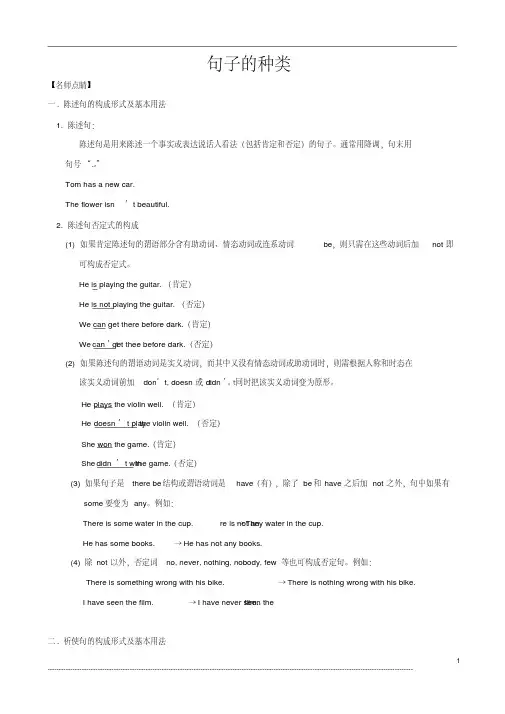
句子的种类【名师点睛】一. 陈述句的构成形式及基本用法1. 陈述句:陈述句是用来陈述一个事实或表达说话人看法(包括肯定和否定)的句子。
通常用降调,句末用。
句号“.”Tom has a new car.The flower isn’t beautiful.2. 陈述句否定式的构成(1) 如果肯定陈述句的谓语部分含有助动词、情态动词或连系动词be,则只需在这些动词后加not即可构成否定式。
He is playing the guitar.(肯定)He is not playing the guitar.(否定)We can get there before dark.(肯定)We can’t get thee before dark.(否定)(2) 如果陈述句的谓语动词是实义动词,而其中又没有情态动词或助动词时,则需根据人称和时态在。
同时把该实义动词变为原形。
该实义动词前加don’t, doesn’t或didn’tHe plays the violin well.(肯定)the violin well.(否定)He doesn’t playShe won the game.(肯定)She didn’t win the game.(否定)(3) 如果句子是there be结构或谓语动词是have(有),除了be和have之后加not之外,句中如果有some要变为any。
例如:There is some water in the cup. →There is not any water in the cup.He has some books. →He has not any books.(4) 除not以外,否定词no, never, nothing, nobody, few等也可构成否定句。
例如:There is something wrong with his bike. →There is nothing wrong with his bike.film.I have seen the film. →I have never seen the二. 祈使句的构成形式及基本用法祈使句是用来表示命令、请求、建议、号召等的句子,谓语动词用原形,句末用感叹号“!”或句号“.”。
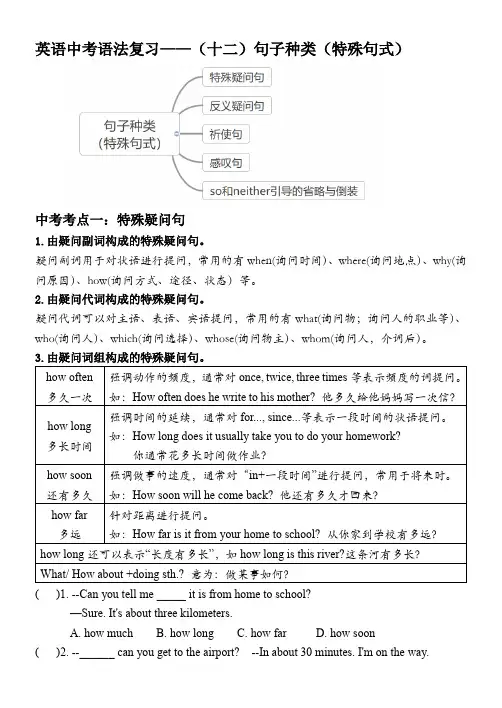
英语中考语法复习——(十二)句子种类(特殊句式)中考考点一:特殊疑问句1.由疑问副词构成的特殊疑问句。
疑问副词用于对状语进行提问,常用的有when(询问时间)、where(询问地点)、why(询问原因)、how(询问方式、途径、状态)等。
2.由疑问代词构成的特殊疑问句。
疑问代词可以对主语、表语、宾语提问,常用的有what(询问物;询问人的职业等)、who(询问人)、which(询问选择)、whose(询问物主)、whom(询问人,介词后)。
how often 多久一次强调动作的频度,通常对once, twice, three times等表示频度的词提问。
如:How often does he write to his mother? 他多久给他妈妈写一次信?how long 多长时间强调时间的延续,通常对for..., since...等表示一段时间的状语提问。
如:How long does it usually take you to do your homework?你通常花多长时间做作业?how soon 还有多久强调做事的速度,通常对“in+一段时间”进行提问,常用于将来时。
如:How soon will he come back? 他还有多久才回来?how far 多远针对距离进行提问。
如:How far is it from your home to school? 从你家到学校有多远?how long还可以表示“长度有多长”,如how long is this river?这条河有多长?What/ How about +doing sth.? 意为:做某事如何?( )1. --Can you tell me _____ it is from home to school?—Sure. It's about three kilometers.A. how muchB. how longC. how farD. how soon( )2. --______ can you get to the airport? --In about 30 minutes. I'm on the way.A. How soonB. How longC. How muchD. How often( )3. --______ have you worked here? —For just one month.A. How oftenB. How longC. How soonD. How much( )4. --We don't have much homework this weekend. Shall we go out together?—OK. What about_______A. to see B seeing C. to see D. sees中考考点二:反义疑问句A. 反义疑问句的标准形式反义疑问句的标准形式是。

初三英语语法复习专项训练习题一.名词部分1、There’s only a little ____in the fridge. That’s not enough for breakfast.A.cakeB.breadC.eggsD.biscuits2、I found the bottle in____room.A.Sara and KateB.Sara’s and kate’sC.Sara’s and kateD.Sara and kate’s3、He often has___for breakfast.A.two breadB.two piece of breadsC.two pieces of breadD.two pieces of breads4、Jack and Tom are___.A.good friendsB.good friendC.a good friendD.good a friend5、There are___in the fridge.A.two milksB.some milksC.two bottles of milkD.two bottles of milks6、June1 is___in China.A.Children’s DayB.Child’s DayTC.Childrens’DayD.Childs’Day7、Are they___cakes ?A.Mr’s GreenB.Mr Green’sC.Mr green’sD.Green Mr’s8、How many____do you want ?A.glasses of milkB.glass of milksC.glasses of milksks9、Mrs Green has two___.They are very bright.A.childsB.childC.children’sD.children(二) 冠词改错;She has a beautiful hair.What cold day!What a bad weather!The history is a very interesting subject.He came here by a train.The robot was an one-eyes man.三,代词部分考试复习题(一).单项选择1 must stay here to wait for .A I, weB We, themC I, theirD Us, they2 My brother asked to go with . A your, her B you, he C you, him3 These exercise books are not butA our, oursB your, theirsC theirs, ours4 She has lost pen will lent .A her, her youB her, his yourC her, her yoursD her, her your5 The twins are looking at in the mirror.A themB themselvesC themselves6 Your teacher must be in the office. I her a moment ago.A have seenB had seenC sawD see7 Is there important in today's newspaper?Yes, there is important in today's newspaper.A something, anythingB anything, somethingC everything, anythingD nothing, anything8 Is there in the classroom? No, there isn’tA any oneB anybodyC anythingD any thing9 Would you like hot milk? No, thanks.A someB littleC a littleD any10 was colder yesterday than today.A ItB ThatC ThoseD This11 He went fishing very early morning two weeks ago.A eachB everyC aD an12which bikes are yours. The blue are .A one, yoursB ours, onesC ones, yoursD ones, ours13 is ready for you.A EveryB AllC BothD That14 You are both wrong of you is right.A AllB EitherC NeitherD Nor15 are you waiting for hereA WhomB WhoseC ThatD Those16 A clock has three hands is short two are longA one, oneB one, the othersC one, the other D. the other, one17 We have time lift. Hurry up.A a littleB fewC littleD a few四.数词考试复习题单项选择单项选择11.What's one plus two? Its .A threeB fourC one12.Five minus two is .A twoB threeC five13.What time is it now? It's .A at sixB six-tenC ten past six14.Mr. White goes to work every morning .A at half past sevenB in half to sevenC at half seven pastD on half past seven15.She goes to bed at in the evening.A a quarter to tenB nine a quarterC ten to a quarterD nine a quarter16.When do you usually have your supper? .A At sixB About sixC in six17.He lived in three days ago.A Room 123B 123 roomC 123 rooms18.Will you try time? Asked the teacher.A a threeB a thirdC third19.The teacher asked us to write composition.A a eight- hundred- wordsB an eight- hundred- wordC an eight- hundred- wordD an eight- hundred- word20.More than of the face of the earthA two thirdB second twoC two thirds21.The building is aboutA twenty- meter- longB twenty –meters- highC twenty meter longD twenty meters high22.If you look up in the sky at night you will seeA a million starB million of starsC millions of starsD million of suns23.10,000 means .A one millionB a thousandC ten thousandD a hundred thousand24Mary bought last month.A three pairs shoesB three pairs of shoeC three pairs of shoesD three shoes五.形容词副词考试复习题单项选择(一)单项选择1\He at half past five every day.A goes to homeB goes homeC go home2\An elephant is than a monkey.A more bigger and strongerB bigger and strongerC much bigger and strongerD much bigger and more3\Which lesson is in Book 3?A a most difficultB more difficultyC most difficultD the most difficult4.The man isn’t to walk.A enough oldB old enoughC old tooD much old5.She didn't speak at yesterday's meeting, and t didn't .A neitherB eitherC tooD also6.I was a worker three years ago, was she. A neither B either C so D nor7.You can't skate , can he.A SoB NorC NeitherD both B and C8.I watch TV once a week, do you watch TV?A how soonB how longC how oftenD when9.This sentence is long to read fluently.A tooB veryC soD enough10.My father hasn't come home, but my mother has been at home for an hour.A already, stillB already, yetC yet, already11.Chinas population is than that of the USA a littleB much largerC much bigger12.How many tomatoes do you want? .A The better, the moreB the more, the sweeterC The less, the moreD The more, the better13.Spring is coming, it's getting .A warmer and wormerB warmer and hotterC warm and warmerD hotter and warmer14England is big China.A as, asB not so, asC so, as15.Who will give us a talk tomorrow morningA anyB otherC anotherD else16.The teacher has to tell us.A anything importantB something important C.important something17.The boy wears a jacket large for him.A very muchB too muchC much too18.Let me show him .A inB intoC insideD outside19Children usually live .A happyB happilyC happyly20.He was a poor man. He has money.A manyB a lot ofC little21.The color TV set was expensive that I couldn't buy it.A soB tooC too muchD such22I can't find my dictionary .A everywhereB nowhereC somewhereD anywhere(二)形容词改错:Can we do our work better with few money and less people?These apples look well.I'm interested in the magazine.She is a young cleaver girl.This bridge is about 10 meters long than that one.。
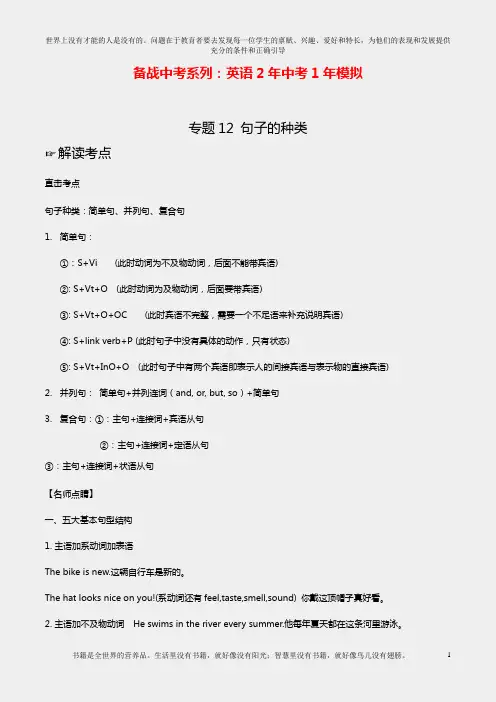
备战中考系列:英语2年中考1年模拟专题12 句子的种类☞解读考点直击考点句子种类:简单句、并列句、复合句1. 简单句:①:S+Vi (此时动词为不及物动词,后面不能带宾语)②: S+Vt+O (此时动词为及物动词,后面要带宾语)③: S+Vt+O+OC (此时宾语不完整,需要一个不足语来补充说明宾语)④: S+link verb+P (此时句子中没有具体的动作,只有状态)⑤: S+Vt+InO+O (此时句子中有两个宾语即表示人的间接宾语与表示物的直接宾语)2. 并列句:简单句+并列连词(and, or, but, so)+简单句3. 复合句:①:主句+连接词+宾语从句②:主句+连接词+定语从句③:主句+连接词+状语从句【名师点睛】一、五大基本句型结构1.主语加系动词加表语The bike is new.这辆自行车是新的。
The hat looks nice on you!(系动词还有feel,taste,smell,sound) 你戴这顶帽子真好看。
2.主语加不及物动词He swims in the river every summer.他每年夏天都在这条河里游泳。
3.主语加及物动词+宾语Children often sing this song.孩子们经常唱这首歌。
4.主语加及物动词加间接宾语加直接宾语She showed her friends all her pictures. 等于She showed all her pictures to her friends.她向她的朋友们展示了她所有的图画。
5.主语加及物动词加宾语加宾语补足语We keep our classroom clean and tidy.我们保持教室干净整洁。
二.疑问句分类及用法见下表:分类概念形式一般疑问句用yes和no来回答的疑问句叫做一般疑问句be加主语加其他?情态动词加主语加动词原形加其他?助动词加主语加动词原形/过去分词加其他?如:—Is she from England? 她来自英格兰吗?—Yes, she is. 是的,她是。
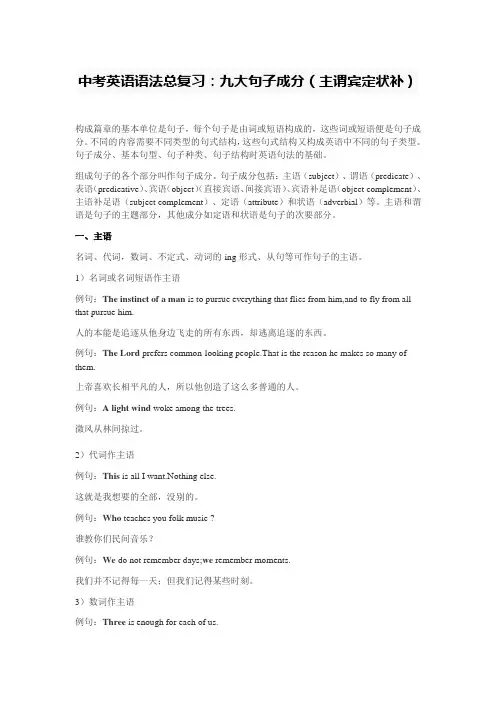
中考英语语法总复习:九大句子成分(主谓宾定状补)构成篇章的基本单位是句子,每个句子是由词或短语构成的,这些词或短语便是句子成分。
不同的内容需要不同类型的句式结构,这些句式结构又构成英语中不同的句子类型。
句子成分、基本句型、句子种类、句子结构时英语句法的基础。
组成句子的各个部分叫作句子成分。
句子成分包括:主语(subject)、谓语(predicate)、表语(predicative)、宾语(object)(直接宾语、间接宾语)、宾语补足语(object complement)、主语补足语(subject complement)、定语(attribute)和状语(adverbial)等。
主语和谓语是句子的主题部分,其他成分如定语和状语是句子的次要部分。
一、主语名词、代词,数词、不定式、动词的-ing形式、从句等可作句子的主语。
1)名词或名词短语作主语例句:The instinct of a man is to pursue everything that flies from him,and to fly from all that pursue him.人的本能是追逐从他身边飞走的所有东西,却逃离追逐的东西。
例句:The Lord prefers common-looking people.That is the reason he makes so many of them.上帝喜欢长相平凡的人,所以他创造了这么多普通的人。
例句:A light wind woke among the trees.微风从林间掠过。
2)代词作主语例句:This is all I want.Nothing else.这就是我想要的全部,没别的。
例句:Who teaches you folk music ?谁教你们民间音乐?例句:We do not remember days;we remember moments.我们并不记得每一天;但我们记得某些时刻。
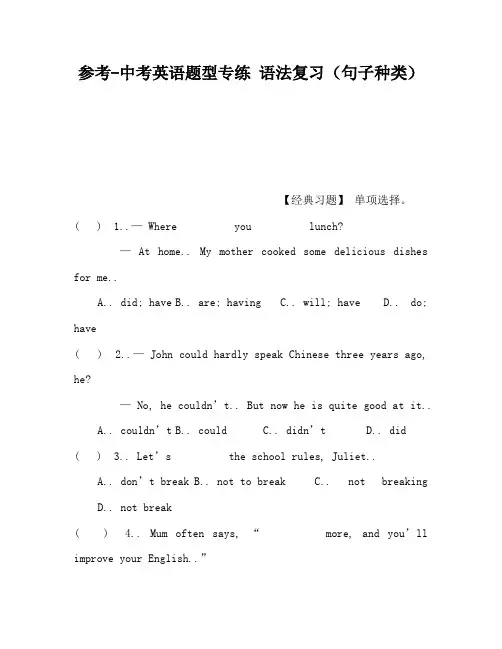
参考-中考英语题型专练语法复习(句子种类)【经典习题】单项选择。
( ) 1..— Where you lunch?—At home.. My mother cooked some delicious dishes for me..A.. did; haveB.. are; havingC.. will; haveD.. do; have( ) 2..— John could hardly speak Chinese three years ago, he?—No, he couldn’t.. But now he is quite good at it..A.. couldn’tB.. couldC.. didn’tD.. did( ) 3.. Let’s the school rules, Juliet..A.. don’t breakB.. not to breakC.. not breakingD.. not break( ) 4.. Mum often says, “more, and you’ll improve your English..”A.. PracticeB.. PracticesC.. PracticingD.. To Practice( ) 5..— interesting speech Mr Zhang has given us!— Yes.. His pronunciation is good too..A.. HowB.. WhatC.. What anD.. How an【考点点拨】★陈述句是用来陈述或说明某一事实或某种观点的句子,包括肯定句和否定句两种。
肯定句就是肯定一个事实;否定句就是否定一个事实,句中常用not或一些否定词(如no, nobody, nothing, never,none, neither等)来表示否定。
★疑问句包括一般疑问句、特殊疑问句、选择疑问句和反意疑问句。
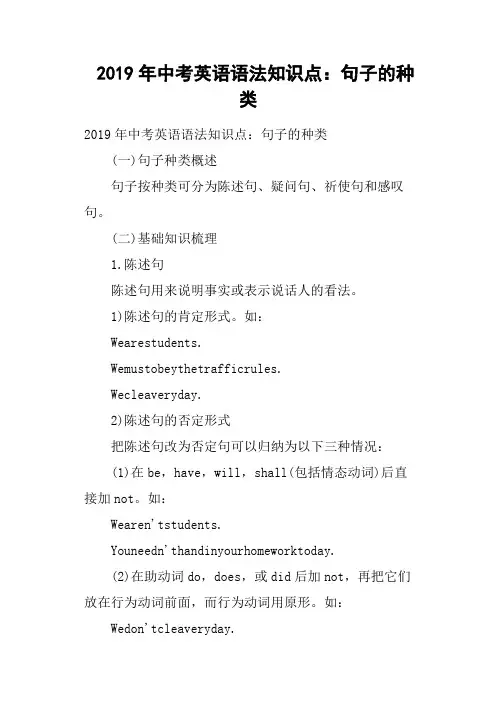
2019年中考英语语法知识点:句子的种类2019年中考英语语法知识点:句子的种类(一)句子种类概述句子按种类可分为陈述句、疑问句、祈使句和感叹句。
(二)基础知识梳理1.陈述句陈述句用来说明事实或表示说话人的看法。
1)陈述句的肯定形式。
如:Wearestudents.Wemustobeythetrafficrules.Wecleaveryday.2)陈述句的否定形式把陈述句改为否定句可以归纳为以下三种情况:(1)在be,have,will,shall(包括情态动词)后直接加not。
如:Wearen'tstudents.Youneedn'thandinyourhomeworktoday.(2)在助动词do,does,或did后加not,再把它们放在行为动词前面,而行为动词用原形。
如:Wedon'tcleaveryday.(3)否定句可由其他形式表示。
如句中出现no,nobody,few,little,neither,hardly,nor,never 等。
如:Therearenobdesk.Icanhardlyansweryourqu Nwinsisadoctor.2.疑问句疑问句就是提出问题,让对方作出回答。
英语中有四种疑问句,即一般疑问句、特殊疑问句、选择疑问句、反意疑问句。
1)一般疑问句用于询问一个事实是否属实,其回答通常是Yes或No。
其结构为:be,will,have,助动词+主语+(主动词)/宾语如:Issheaunivacher?Willitbewindw?Didhetakepaaday?2)特殊疑问句特殊疑问句对句中某一特定部分提问,以特殊疑问词开头根据实际情况,不必用Yes或No回答。
常见的特殊疑问词有what,who,whom,when,what,time,where,why,which,whose,howold,howmany+可数名词复数,howmuch+不可数名词,howlong,howfar,howfast,howsoon等。
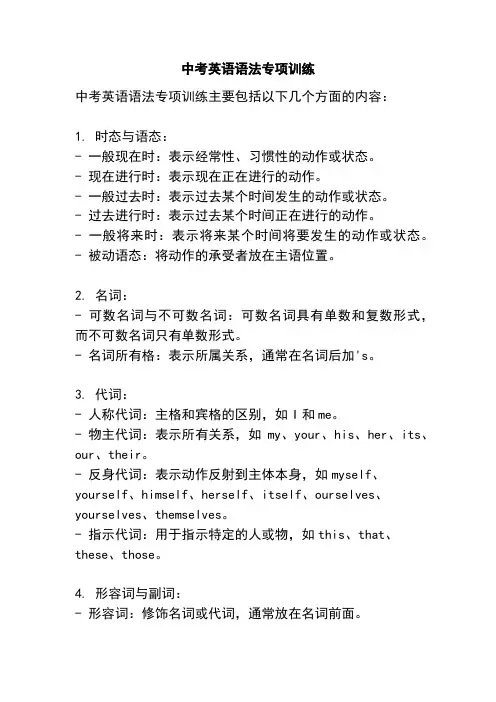
中考英语语法专项训练中考英语语法专项训练主要包括以下几个方面的内容:1. 时态与语态:- 一般现在时:表示经常性、习惯性的动作或状态。
- 现在进行时:表示现在正在进行的动作。
- 一般过去时:表示过去某个时间发生的动作或状态。
- 过去进行时:表示过去某个时间正在进行的动作。
- 一般将来时:表示将来某个时间将要发生的动作或状态。
- 被动语态:将动作的承受者放在主语位置。
2. 名词:- 可数名词与不可数名词:可数名词具有单数和复数形式,而不可数名词只有单数形式。
- 名词所有格:表示所属关系,通常在名词后加's。
3. 代词:- 人称代词:主格和宾格的区别,如I和me。
- 物主代词:表示所有关系,如my、your、his、her、its、our、their。
- 反身代词:表示动作反射到主体本身,如myself、yourself、himself、herself、itself、ourselves、yourselves、themselves。
- 指示代词:用于指示特定的人或物,如this、that、these、those。
4. 形容词与副词:- 形容词:修饰名词或代词,通常放在名词前面。
- 副词:修饰动词、形容词、副词或全句,通常放在动词或形容词后面。
5. 介词:- 表示时间、地点、方式、原因等关系。
- 常用的介词有in、on、at、by、with、from、to等。
6. 连词:- 并列连词:连接并列的词、短语或句子,如and、but、or。
- 从属连词:引导从句,如because、if、when、while。
7. 动词:- 不规则动词的过去式和过去分词形式。
- 动词的时态和语态的正确使用。
8. 句子结构:- 主谓结构:句子中必须有主语和谓语。
- 定语从句:用来修饰名词的从句,通常由关系代词或关系副词引导。
- 状语从句:用来修饰动词、形容词或副词的从句,通常由连词引导。
以上是中考英语语法专项训练的主要内容,希望对你有所帮助。
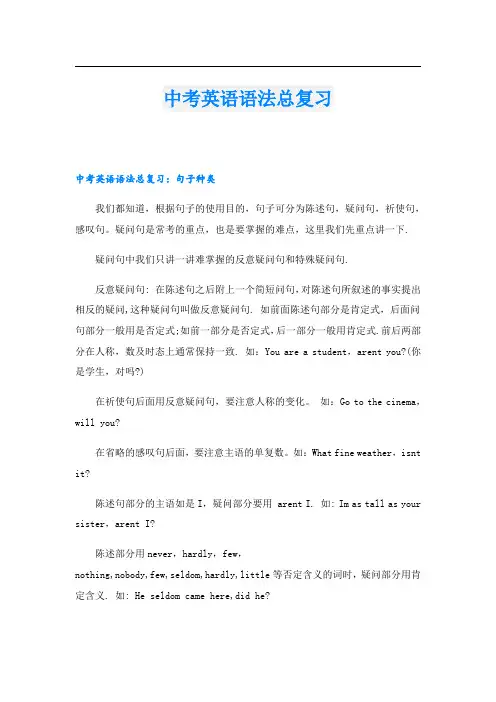
中考英语语法总复习中考英语语法总复习:句子种类我们都知道,根据句子的使用目的,句子可分为陈述句,疑问句,祈使句,感叹句。
疑问句是常考的重点,也是要掌握的难点,这里我们先重点讲一下.疑问句中我们只讲一讲难掌握的反意疑问句和特殊疑问句.反意疑问句: 在陈述句之后附上一个简短问句,对陈述句所叙述的事实提出相反的疑问,这种疑问句叫做反意疑问句. 如前面陈述句部分是肯定式,后面问句部分一般用是否定式;如前一部分是否定式,后一部分一般用肯定式.前后两部分在人称,数及时态上通常保持一致. 如:You are a student,arent you?(你是学生,对吗?)在祈使句后面用反意疑问句,要注意人称的变化。
如:Go to the cinema,will you?在省略的感叹句后面,要注意主语的单复数。
如:What fine weather,isnt it?陈述句部分的主语如是I,疑问部分要用 arent I. 如: Im as tall as your sister,arent I?陈述部分用never,hardly,few,nothing,nobody,few,seldom,hardly,little等否定含义的词时,疑问部分用肯定含义. 如: He seldom came here,did he?陈述句部分的谓语是used to时,疑问部分用didnt+主语或usednt +主语.如: He used to go to school at seven, didnt he? / usednt he?陈述部分有had better + v. 疑问句部分用hadnt you? 如: Youd better read it by yourself, hadnt you?陈述部分有Youd like to +v.疑问部分用wouldnt+主语. 如:Youd like to go with me, wouldnt you?主语是everyone, someone,anyone,no one等不定代词时,多用they 指代.如:Everyone is here,arent they?(所有的人都来了吗?)主语是everything,something,anthing,nothing时,用it 指代。
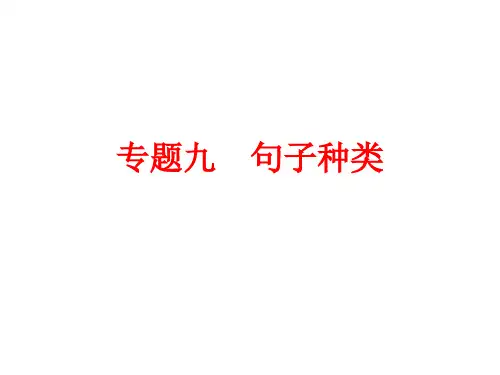
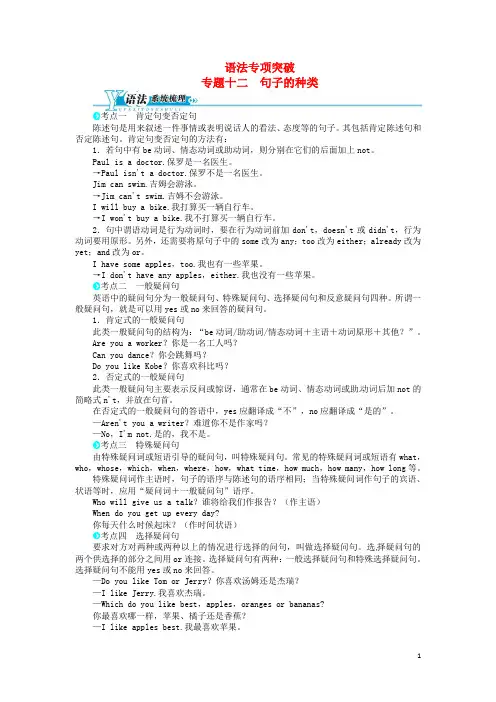
语法专项突破专题十二句子的种类考点一肯定句变否定句陈述句是用来叙述一件事情或表明说话人的看法、态度等的句子。
其包括肯定陈述句和否定陈述句。
肯定句变否定句的方法有:1.若句中有be动词、情态动词或助动词,则分别在它们的后面加上not。
Paul is a doctor.保罗是一名医生。
→Paul isn't a doctor.保罗不是一名医生。
Jim can swim.吉姆会游泳。
→Jim can't swim.吉姆不会游泳。
I will buy a bike.我打算买一辆自行车。
→I won't buy a bike.我不打算买一辆自行车。
2.句中谓语动词是行为动词时,要在行为动词前加don't,doesn't或didn't,行为动词要用原形。
另外,还需要将原句子中的some改为any;too改为either;already改为yet;and改为or。
I have some apples,too.我也有一些苹果。
→I don't have any apples,either.我也没有一些苹果。
考点二一般疑问句英语中的疑问句分为一般疑问句、特殊疑问句、选择疑问句和反意疑问句四种。
所谓一般疑问句,就是可以用yes或no来回答的疑问句。
1.肯定式的一般疑问句此类一般疑问句的结构为:“be动词/助动词/情态动词+主语+动词原形+其他?”。
Are you a worker?你是一名工人吗?Can you dance?你会跳舞吗?Do you like Kobe?你喜欢科比吗?2.否定式的一般疑问句此类一般疑问句主要表示反问或惊讶,通常在be动词、情态动词或助动词后加not的简略式n't,并放在句首。
在否定式的一般疑问句的答语中,yes应翻译成“不”,no应翻译成“是的”。
—Aren't you a writer?难道你不是作家吗?—No,I'm not.是的,我不是。
句子的种类知识点详解(初中英语专项复习)句子类型分为4种:在中考题型中,感叹句和疑问句考得最多。
特别疑问句,疑问词的用法是最重要的考题之一。
【典例】1. 他们还赢得了广东省飞镖比赛冠军。
多么棒的项目啊!They won the Championship of Guangdong Darts Match, too. ________________________ project it is!【答案】What a wonderful【解析】根据题干可知此处是一个感叹句。
中心词为可数名词project“项目”,符合结构:What+ a/an+形容词+主语+谓语。
project是以辅音音素开头,应用a;wonderful“极好的”。
故填What a wonderful。
2.. ________ it was to see the main sights of the world in the World Park!A How amazing day B. How an amazing dayC. What amazing dayD. What an amazing day【答案】D【解析】句意:在世界公园里看到世界的主要景点是多么美妙的一天啊!考查感叹句。
句子是感叹句,中心词是可数名词单数day,用感叹句结构:What a/an adj. n.+主谓。
故选D。
3.. —China won all the gold medals at the 2023 World Table Tennis Championships.—______ exciting news!A. What aB. How aC. HowD. What 【答案】D【解析】句意:——中国包揽了2023年世乒赛的所有金牌。
——多么令人兴奋的消息啊!考查感叹句,感叹句的中心词news是不可数名词,此处用“What+形容词+不可数名词”结构。
语法专项训练四句子的种类、并列句和复合句、主谓一致句子的种类一、单项选择1.—I’m leaving now.— you turn off the lights.A.To make sureB.Make sureC.Made sureD.Making sure答案:B解析:祈使句开头用动词原形。
2.—Your brother often disagrees with you, he?—. We often have different opinions.A.does; YesB.doesn’t; YesC.does; NoD.doesn’t; No答案:B解析:由“Your brother often disagrees with you”可知前面分句是主语为第三人称单数且含有实义动词的肯定句, 根据反意疑问句“前肯后否”的原则可知第一空填doesn’t; 又根据“We often have different opinions.”可知答案为B项。
3.Hey, Nick. comes the last bus! Hurry up, or we’ll have to walk home.A.ThisB.ThereC.ThatD.It答案:B解析:there在此引导倒装句。
4. —I hear Huang Gang made an English speech at the graduation ceremony yesterday.—, and .A.So he did; so did IB.So did he; so I didC.So he was; so was ID.So was he; so I was答案:A5.— do you hang out with your friends?—Once a week.A.How longB.How manyC.How soonD.How often答案:D解析:“Once a week.”是表频率的副词短语, 因此提问时要用how often, 故答案:选D项。
中考英语句子种类专项复习【考点清单】一、特殊疑问句1.由疑问副词构成的特殊疑问句。
疑问副词用于对状语进行提问,常用的有 when(询问时间)、where(询问地点)、why(询问原因)、how(询问方式、途径、状态)等。
2.由疑问代词构成的特殊疑问句。
疑问代词可以对主语、表语、宾语提问,常用的有what(询问物;询问人的职业等)、who(询问人)、which(询问选择)、whose(询问物主)、whom(询问人)。
3.由疑问词组构成的特殊疑问句。
how many(询问数量,后接可数名词复数)、 how much(询问价钱或不可数名词的量)、 how long(询问时间或物体的长度)、how soon(询问将来的时间段)、how often(询问频率)、how far(询问距离)、how old(询问年龄)等。
二、反意疑问句4.反意疑问句的构成。
反意疑问句是在陈述句之后附加上一个简短问句,对陈述句所叙述的事情提出相反的疑问。
陈述部分为肯定形式时,附加问句应用否定形式,反之亦然;附加问句的主语及动词的形式要和陈述句保持一致,而且主语用人称代词。
5.陈述部分谓语含有used to 时,附加问句的谓语可用used 也可用did。
6.陈述部分为 there be句型时,附加问句一般仍用there。
something、anything、nothing、everything等时,附加问句的主语用it;陈述部分的主语为指人的不定代词somebody、anybody、 nobody、everybody等时,附加问句的主语可用he、they 等,但不可用it。
8.陈述部分为肯定的祈使句,附加问句用willyou 或won't you;陈述部分为否定的祈使句,附加问句用will you。
陈述部分为Let’s开头的祈使句,附加问句应用shall we;陈述部分为Letus/me开头的祈使句,附加问句应用 will you.9.陈述部分有few、little、nothing、nobody、no、never、hardly等表示否定意义的词时,附加问句用肯定形式。
句子种类一、考点梳理考点一陈述句陈述句用来陈述事实或看法,一般用降调,句末用句点。
陈述句包括肯定句和否定句。
1. 肯定句肯定句的基本结构为“主语+ 系动词+ 表语”或“主语+ 谓语+ 其他”。
My brother is a bus driver.我的哥哥是一名公共汽车司机。
2. 否定句(1) 如果句子中含有be 动词、助动词或情态动词,在它们之后直接加上not 构成否定形式。
The girl isn’t studying in the classroom.那个女孩没有在教室里学习。
(2) 如果句子的谓语动词是实义动词,其否定形式为:助动词do/does/did + not + 实义动词(原形)。
Mike doesn’t have a brother. 迈克没有哥哥。
(3) 除了not 以外,还有一些可以构成否定句的否定词,如:no (= not any / not a), no one, never, nothing, nobody, neither, none。
I have never been abroad. 我从来没有去过国外。
(4) 句子中含有little, few, seldom, hardly时,表示否定。
I can hardly sing English songs.我几乎不会唱英文歌曲。
(5) 当all, both, each, everyone, everything, everywhere, always 等表示总括意义的词和not 连用时,表示部分否定。
Not all the girls like bright colours.不是所有的女孩都喜欢鲜艳的颜色。
注意:如果肯定句中含有some, somebody, someone, something, somewhere, already, 变为否定句时,要分别改为any, anybody, anyone, anything, anywhere, yet。
句子的种类一、陈述句1)陈述句的肯定形式I am a sixteen-year-old German student.She wants to know what you think.They will write a report about wasting water.Mary showed us around the modern schoolThe Russians have sent an Astronaut into space.2)陈述句的否定形式把陈述句改为否定句可以归纳为以下三种情况1 ) 在be, have, will, shall, can, need, must, may, should, would, could 后直接力口note.g Lily and Liz are twins.Lily and Liz aren't twins.e.g She can speak English very fluently.She can' t speak English very fluentlye.g They have got four classes in the morningThey haven' t got four classes in the morninge.g There will be a lecture in our school tomorrow.There won' t be a lecture in our school tomorrow.2)在助动词do, does或did后加not,再把它们放在行为动词前面,而行为动词原形e.g We clean the room every dayWe don't clean the room every daye.g .She finished her homework yesterdayShe didn't finish her homework yesterdaye.g .Mary speaks English very well.Mary doesn't speak English very well.3)否定句可有其他形式表示.如句中出现no, nobody, few, little, neither, hardly, nor, never等There are no books on the desk.Nobody can answer my questionThere is little time leftNeither of my parents is a teacher二疑问句疑问句就是提出问题,让对方作出回答.英语中有四种疑问句,即一般疑问句,殊疑问句,选择疑问句,反意疑问句1 . 一般疑问句用Yes或No来回答的疑问句,一般用升调.它的构成有如下两种:1)用be 动词,助动词(will, shall, would, should),情态动词(can, need, must, may, could)或have开头Can she speak English?Are you all students?2)用助动词(do, did, does)开头,后接动词原形Do you go to school on foot?Did he take part in the maths contest yesterday?2.特殊疑问句由特殊疑问句词加一般疑问句构成.它不能用Yes或No回答,一般用降调,常见的特殊疑问词有what, who, whom, when, what time, where, why, which, whose, how old, how many+可数名词复数,how much+不可数名词,how long, how far, how fast, how soon1) .疑问词who, what作主语或主语的一部分时,用陈述语序Which picture is the best?What happened to him just now?Who has lunch fastest at school in our class?2) .疑问词when, where, why, how等加一般疑问句.When will you go to the airport to meet your uncle?Where is Li Ping?Why didn' t she go to the cinema last night?How long have you lived here?3)选择疑问句在疑问句中,用or连接两个或两个以上等同成分的单词或词组,让别人进行选择,不能用Yes或No来回答,而只能是选择其中之一,或全选,或全不选来回答.它可以有以下两种形式A 由一般疑问句开头eg. Is there any coffee or water in the cup?Do you often play basketball or play the piano?B由特殊疑问句开头eg. Who gets up earlier, your father or your mother?Which is the biggest, the moon, the earth or the sun?4・反意疑问句由两部分组成,前半句为陈述句,后半句是一个附着在前半句上的简短问句,回答时用Yes 或No.它的构成和回答主要如下:1 )如果前半句是肯定句,那么后半句是否定的缩写形式.e.g. They are interested in collecting stamps, aren' t they?—Yes, they are.是的.他们对收集邮票感兴趣.---No, they aren't.不,他们他们对收集邮票不感兴趣.2)如果前半句是否定句,那么后半句就用肯定形式加代词构成e.g: Tom didn' t pass the exam, did he?—Yes, he did. 不,他通过了考试.--No, he didn' t,是,他没通过考试三、祈使句1、含义:表示命令、请求、建议、劝告的句子被称为祈使句。
2015中考题型专练之语法复习(句子种类)【经典习题】单项选择。
( ) 1.— Where you lunch?— At home. My mother cooked some delicious dishes for me.A. did; haveB. are; havingC. will; haveD. do; have( ) 2.— John could hardly speak Chinese three years ago, he?—No, he couldn’t. But now he is quite good at it.A. couldn’tB. couldC. didn’tD. did( ) 3. Let’s the school rules, Juliet.A. don’t breakB. not to breakC. not breakingD. not break( ) 4. Mum often says, “ more, and you’ll improve your English.” A. PracticeB. PracticesC. PracticingD. To Practice( ) 5.— interesting speech Mr Zhang has given us!— Yes. His pronunciation is good too.A. HowB. WhatC. What anD. How an【考点点拨】★陈述句是用来陈述或说明某一事实或某种观点的句子,包括肯定句和否定句两种。
肯定句就是肯定一个事实;否定句就是否定一个事实,句中常用not或一些否定词(如no, nobody, nothing, never, none, neither等)来表示否定。
★疑问句包括一般疑问句、特殊疑问句、选择疑问句和反意疑问句。
?一般疑问句通常用yes或no来回答。
陈述句变为一般疑问句时,如果谓语动词中含有be 动词、助动词或情态动词,则直接把它们提到句首;如果谓语动词是行为动词,则要根据人称和时态,在句首加do,does或did,并将行为动词变成原形。
温馨提示:由must引导的一般疑问句的肯定回答用must,否定回答用needn’t或don’t have to;由may引导的一般疑问句的肯定回答用may,否定回答一般用may not,但当表示绝对禁止时用can’t或mustn’t。
?特殊疑问句是就句中某一成分提问的句子,需有疑问词(如what, who, whom, whose, which, when, where, why, how等)引导。
?选择疑问句是指提供两种或多种情况供对方选择的疑问句,回答时不用yes或no,而是根据具体情况直接作出回答。
选择疑问句的形式可以是一般疑问句形式,也可以是特殊疑问句形式:①一般疑问句形式的选择疑问句由“一般疑问句 + or + 选择部分(有时选择部分用or not来表示)”构成;②特殊疑问句形式的选择疑问句由“特殊疑问句,选项 A + or + 选项B”构成。
?反意疑问句是中考常考的知识点。
以下几点需特别注意:①反意疑问句遵循“前肯后否,前否后肯”原则,即前面的陈述句是肯定的,反意疑问部分用否定形式;前面的陈述句是否定的,反意疑问部分用肯定形式;②当陈述部分为there be句型时,反意疑问部分用“be + there”;③当陈述部分有hardly, few, little, never, nothing等表示否定意义的词时,反意疑问部分用肯定形式;④当陈述部分为祈使句时,反意疑问部分通常用will you或won’t you;⑤由let’s引起的祈使句,反意疑问部分用shall we;⑥对反意疑问句的回答,只要事实是肯定的,就用yes回答;事实是否定的,就用no回答。
★祈使句是用来表示请求、命令、劝告、建议等的句子。
?肯定形式:①以动词原形开头;②Let + 宾语 + 动词原形。
?否定形式:①Don’t + 动词原形;②Don’t let + 宾语 + 动词原形 / Let + 宾语 + not + 动词原形;③No + 名词 / 动名词。
★感叹句是用来表示喜、怒、哀、乐等强烈感情的句子,通常由how或what来引导。
?what通常修饰名词,引导的感叹句的结构为:①What + a / an + 形容词 + 可数名词单数 + 主语 + 谓语!②What + 形容词 + 可数名词复数 / 不可数名词 + 主语 + 谓语!?how通常修饰形容词或副词,引导的感叹句的结构为:How + 形容词 / 副词 + 主语 + 谓语!【即时操练】一、单项选择。
( ) 1.— Do you like to go to the movies?— Yes, I .A. amB. doC. doesD. did( ) 2.— Must I wash my clothes now, Dad?— No, you . You can do it after the talk show.A. mustn’tB. shouldn’tC. wouldn’tD. needn’t( ) 3.— May we leave now?— No, you . You must wait until the bell rings.A. won’tB. don’t have toC. needn’tD. can’t( ) 4.— Are you going to borrow a pen or a pencil?—.A. A penB. Yes, a penC. No, pencilD. Yes, both ( ) 5. Ms Smith said, “Liu Li has been to Victoria Falls, he?”A. doesn’tB. didn’tC. hasn’tD. isn’t ( ) 6. here and don’t go around, or your parents cannot find you.A. To stayB. StayedC. StayD. Staying( ) 7.— Sorry for being late again.—here on time next time, or you’ll be punished.A. BeB. BeingC. To beD. Been( ) 8. — and play ping-pong in the new gym after school.— Okay.A. Let’s to goB. Let’s goC. Let’s don’t goD. Not let’s go ( ) 9. weather it is today! Let’s go out for a walk.A. How fineB. What fineC. What a fineD. How a fine( )10.— Tina, do you like my kite?—! It’s the nicest one I’ve ev er seen!A. What wonderfulB. How wonderful kiteC. How wonderfulD. What wonderful kite二、按要求改写下列句子(每空一词)。
1. There were many foreign students in the school last year. (改为一般疑问句)many foreign students in the school last year?2. Ann bought a pair of sports shoes last Monday. (改为一般疑问句)Ann a pair of sports shoes last Monday?3. We can see some flowers in front of the house. (改为否定句)We see flowers in front of the house.4. Lisa has already finished the film review. (改为否定句)Lisa finished the film review .5. All of us want him to go rock climbing with us. (改为否定句)of us him to go rock climbing with us.6. I was born in Beijing in 1990. (对划线部分提问)were you born?7. Susan improves Chinese by listening to Chinese news on the radio. (对划线部分提问)Susan improve Chinese?8. Sui’s sister works as a worker. (用a teacher改为选择疑问句)Sui’s sister work as a worker a teacher?9. Tom writes to his pen friend twice a week. (改为反意疑问句)Tom writes to his pen friend twice a week, ?10. If you don’t hurry up, you’ll miss the early train. (改为同义句), or you’ll miss the early train.Key:【经典习题】1-5 ABDAC【即时操练】一、 1-5 BDDAC 6-10 CABBC二、 1. Were there 2. Did; buy3. can’t; any4. hasn’t; yet5. None; want(s)6. When and where7. How does 8. Does; or9. doesn’t he 10. Hurry up。